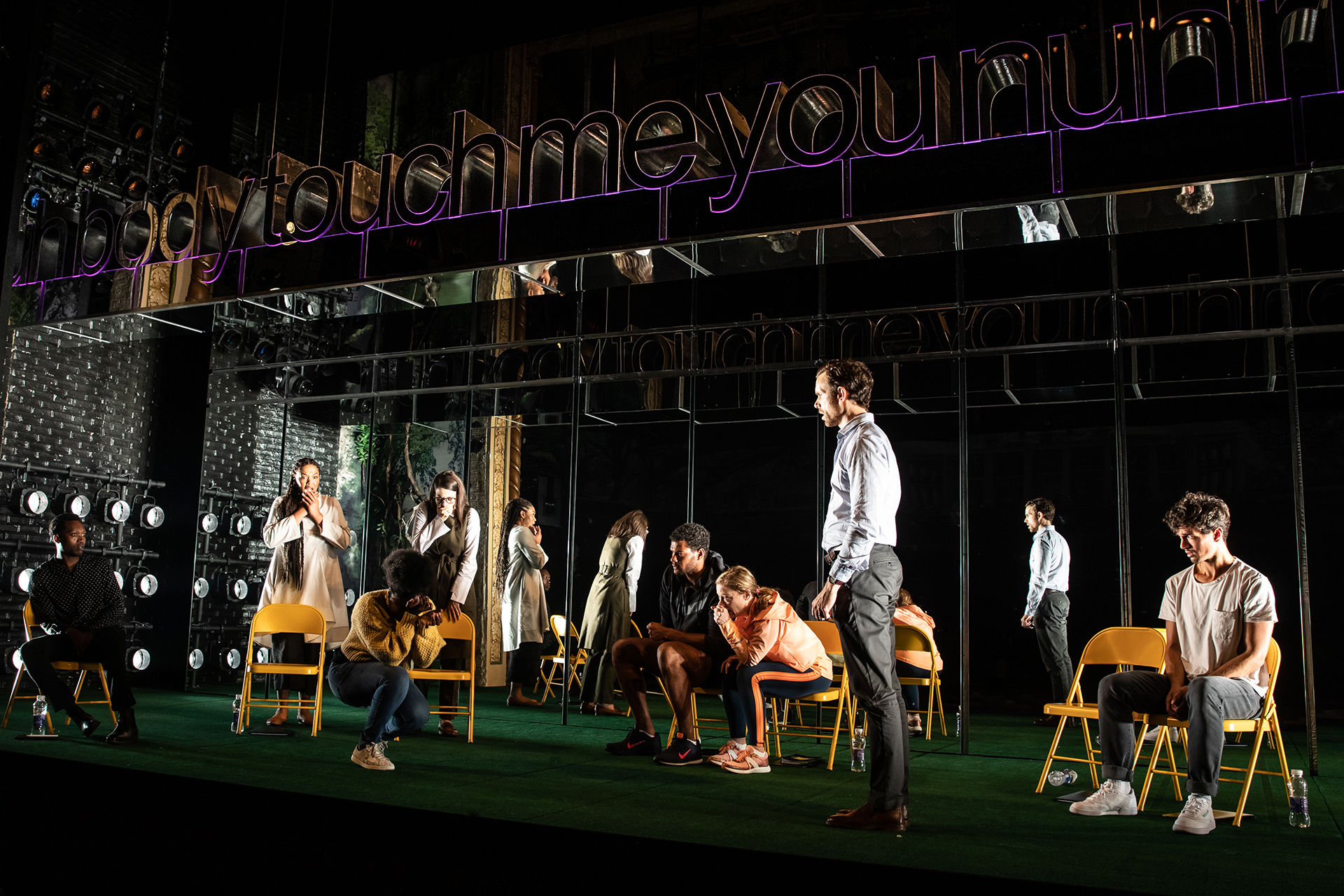Satirical ‘Slave Play;’ ‘Betrayal’ Revival

The raves and buzz surrounding playwright Jeremy O. Harris are well deserved. A surprising young writer, his grasp of dramatic form, from medieval miracle plays to silent movies, is on par with his sociological observations and psychological insights. His Broadway premiere, “Slave Play,” is equally all over the place, and delightfully so.
It is directed by Robert O’Hara, who has championed Harris from early in his career. While O’Hara paces the production for satire and farce, which it is, he also allows the actors to breathe fully in the dramatic scenes.
Structurally, the play falls into two completely diverse spheres. In Act I, the characters act out their relationship issues through sexual fantasy play. And in Act II, they deconstruct the fantasies, also at times through sex play.
In the second act, we meet the graduate students, Tea (Chalia La Tour) and Patricia (Irene Sofia Lucio) who lead the program, “Antebellum Sexual Performance Therapy.” It’s designed for people with “RID” — “Racialized Inhibiting Disorder.” And the participants in the study are “minoritarians,” whose self-image has been shaped by racial trauma. Their difficulties in identifying and expressing feelings about race also fuel the impasse to empathy and communication. At least, so we are told.
While the study appears cut and dry, the dissertation overall is delivered with a dose of sarcasm that is so impish and well-intended that we are happy to receive it. Still, as the program notes attest, the overall effect for audiences is “discomfort.” And some of the assertions we hear, and sex acts we see, are defiling.
An especially coy dynamic takes place between young gay men in a two-year relationship. A sexy actor type, Dustin, played by James Cusatic-Moyer with boundless magnetism, and Gary, sensitively played by Ato Blandson-Wood, argue about their racial differences.
Gary, being black, seems to have the stronger case, but Dustin’s claim that he is of the other “nonwhite” race is believable. After all, his racial appearance is ambiguous. And if you take that to be facetious, you’re discriminating against Hispanic people, and Middle Eastern people, etc.
Also, in erotic pose (Act I), Jim (Paul Alexander Nolan) and Kaneeisha (Joaquina Kalukango) work out their psycho sexual fantasies in comeddia della arte fashion. Their stereotypes of a “masa” and his slave are presented so fully as to appear indelible, iconic even. Sweeping the stage with her hoop skirt, Kalukango performs the sexual rituals demanded by Jim. When we meet them again in Act II, they are a contemporary married couple who are violently and self-destructively entangled.
Commanding performances from Sullivan Jones as the mulatto sex slave to the plantation owner’s wife (Annie McNamara) in Act I round out the cast of characters. Later in the play, however, we observe Phillip’s (Sullivan’s) narcissistic obsession as the primary obstacle to communication with his white wife, Alana (McNamara). Their relationship speaks to the playwright’s fair, and unbiased depiction of racial conflict.
A dark comedy that is intricately constructed, and complex, still carries a clear and bright message. The urgency to listen sings out. Hopefully, there is comedy to be found in that.
Betrayal
Director James Lloyd’s revival of Harold Pinter’s “Betrayal” embraces a chilly minimalism. As the pinnacle of this complex love triangle, Robert (Tom Hiddleston) is an opaque, fully restrained husband, one who’s certainly not into drama.
Last revived on Broadway in 2013, in a production starring Daniel Craig, one now sees how differently the role can be interpreted. Handsomely, Craig brought the passion of “Othello” to the role. But Hiddleston, the Marvel film hero (“Thor”), is anything but a shape shifter here. He is single mindedly in control of his every move, and more importantly the emotions — whatever they are — beneath his firm and silent demeanor.
As his best friend, and rival, Charlie Cox’s Jerry is such an amiable, and friendly companion, one can hardly find anything to dislike about him. Where Robert is sternly self-commanding, Jerry is relaxed. While Robert is very sure of himself, Jerry is confident without stressing. In effect, Jerry is perfect. Still youthful, in service of his middle-aged success, he’s handsome, metrosexual, and worldly beyond conceit.
Similarly, Zawe Ashton’s Emma is an icon of physical perfection, unusually tall, and slender. Her flawless beauty captures our gaze, but her sense of quest feels vapid, especially to her. Put them all together on a single set with a rotating disc in the middle of the stage (Soutra Gilmour, designer), and you have a three-person theater piece that plays like chamber music. Beautifully well-paced, the production averts any perception of the characters as fully human, or fully realized.
Their relationships are calculated like the mechanics of the rotating disc on stage, and manipulative in the way adultery is. But for a long-term marriage, such deliberate and controlled behaviors also express a determination for mutual survival. This revival is also very sad in that way.
Mulling beneath the surface lies a sense of disappointment, sadness, and loss. The mess of betrayals, revealing innate hypocrisy, and the fear of facing one another are bewildering and omnipresent. With all of the characters on stage throughout, we also watch them, painfully watching each other.
The contemporary staging, with its evocation of industrial design, flies on the heels of Pinter’s sparse use of language, telling pauses, and resonant silences. So do Gilmour’s costumes — one costume per actor for all of the scenes, regardless of where and when they take place. There is a relentless monotone to that.
It leads us to that which lies between the lines. A betrayal of self, and fidelity to one’s self, speaks loudly here. Things stay the same, the status quo isn’t altered, but there is something missing, something not stated but distinctly present that is revealing about all three relationships. It’s certainly revealing about love, middle age, and the fear of what is to come.



